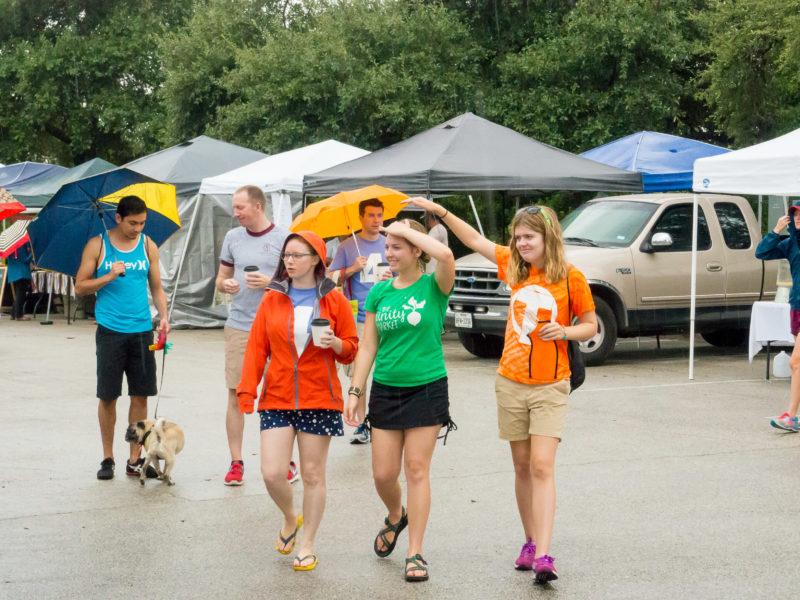Over the recent winter break, Jacob Tingle, co-director of the Center for Experiential Learning and Career Success, announced the closing of the Trinity Market, the university’s first farmers’ market, which thrived thanks to student and staff volunteers, as well as the presence of vendors from the San Antonio community.
“I think farmers’ markets are really important, and I liked that the Trinity Market introduced students to the concept in a way that was fun,” said Claire Burrus, a junior political science and environmental studies double major.
The Trinity Market prioritized its emphasis of healthy eating and getting exercise by providing its many attendees with the opportunities to purchase organic food from both food trucks and stands, as well as yoga and dance classes that were available to participants of various skill levels.
“In terms of sustainability, I encourage people to turn to farmers’ markets as a grocery source. Often young people are unaware of these markets or think that they are out of their price range,” Burrus said.
Over the past few years, Trinity has been encouraging college students to eat healthier, more sustainable meals. It has already implemented a number of measures to do so, including opening Freshii and bringing low-calorie options, especially through PorVida, to the P.O.D. and Mabee Dining Hall.
“The Trinity Market emerged during a time where many markets around the city were sprouting up. While having more farmers’ markets definitely gave our community an opportunity to purchase some local, sustainable produce and try new and flavorful foods, in addition to other handmade products, it also made it difficult for the vendors to travel, staff and stock their multiple markets,” said Hayley Sayrs, Trinity alumna and previous head of the Trinity Market.
While the market was able to host a wide variety of vendors, numerous factors affected their success when it came to selling their goods, such as weather conditions and the tendency of students to have smaller budgets.
“Many of these other markets have also closed their doors in response to a plethora of challenges and customer demands not being met. Farmers’ markets are very ephemeral in design and are also logistically challenging due to weather, timing, product availability and price. I think that even with funding, ensuring the sustainability of the market would definitely have been a challenge for anyone,” Sayrs said.
The Trinity Market originally started thanks to a grant written by professors Carolyn Becker and Luis Martinez prior to the start of the spring 2016 semester. The market immediately drew positive attention by providing the community with initiatives to have healthier lifestyles.
“What made the Trinity Market successful was the way it brought together stakeholders from all across campus. We all brought passion and excitement to the project. Overall, I think it was an educational and enriching experience for anyone who participated, making it more than just a market. Our core team worked together to bridge the gap between Trinity and the outside community,” Sayrs said.
Sayrs is currently working with the Food Policy Council of San Antonio (FPCSA), which is currently focusing on farm-to-school initiatives, which will ultimately allow students to experience healthier lifestyles thanks to a better education.
“With the FPCSA, we are working to encourage and support school gardens, enhance nutrition and food-system education and pass legislation that allows schools to purchase more food locally from farmers and other outside vendors. If Trinity can shift to sourcing more local and sustainable products in the dining halls, we can serve as a model for other universities and institutions seeking to implement farm-to-school initiatives on their campuses,” Sayrs said.
While the Trinity Market won’t be running every Saturday this semester, there is the possibility that it may be brought back in the future, but with a different approach. Tingle believes that perhaps it might be better if the Trinity Market later operated on a once-a-month basis to lower costs and create a different marketing strategy in order to maximize attendance.
“A lot of the costs are variable, so if the Trinity Market is only running one Saturday a month, there’s a lot of cost savings,” Tingle said. “I think there is a market for the Trinity Market and we should start thinking about how we are going to do it differently if it returns. There was that neat sense of community surrounding the market.”
For Tingle, working with the Trinity Market team was a valuable learning experience that gave him and the rest of the team a guidebook for implementing projects and events like the Trinity Market in the future. Tingle witnessed collaborative efforts between multiple on-campus departments, including the business office and university marketing & communications, among others.
“It was neat for me to understand and get a much better sense of what happens at Trinity to make an event occur. I’ve been on campus for 16 years and didn’t have that knowledge of what goes on on at that side of Trinity and the awesome people that have been helping out the university,” Tingle said.
Students can learn more about sustainability and healthy options through the Food Matters First Year Experience, the gardening class and other classes in departments such as environmental studies, biology and geosciences. Through shared learning, better communication with the rest of the community and a greater incentive to increase sustainability, Trinity students, faculty and staff can increase food quality and well-being on campus.
If the Trinity Market returns to campus, all community members will be invited to attend and volunteer at its future sessions.







